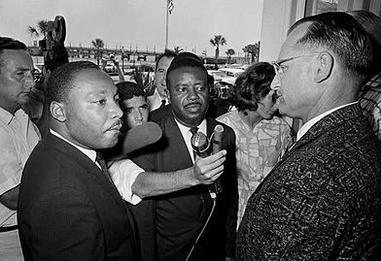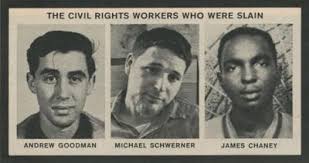MLK Linked the Struggles to End Racism, Poverty and War
Six decades after the passage of the Civil Rights Act of 1964 and the escalation of the Vietnam War, workers, oppressed peoples and youth are still fighting for full equality and self-determination

All Global Research articles can be read in 51 languages by activating the Translate Website button below the author’s name (only available in desktop version).
To receive Global Research’s Daily Newsletter (selected articles), click here.
Click the share button above to email/forward this article to your friends and colleagues. Follow us on Instagram and Twitter and subscribe to our Telegram Channel. Feel free to repost and share widely Global Research articles.
New Year Donation Drive: Global Research Is Committed to the “Unspoken Truth”
***
January 15, 2024 marks the 95th birthday of Dr. Martin Luther King, Jr. (1929-1968), a federally recognized holiday in the United States since 1986.
Dr. King was the most well-known and respected leader within the mass Civil Rights Movement which arose during the Montgomery Bus Boycott of 1955-56.
His assassination on April 4, 1968 took place while he was in Memphis, Tennessee lending his support to a sanitation workers strike. Dr. King was preparing for the Poor People’s Campaign aimed at eradicating poverty in the United States. The Civil Rights leader after 1967, came out forcefully against the U.S. genocidal war in Vietnam making him a target for the federal government to be eliminated.
Between 1957, when the Southern Christian Leadership Conference (SCLC) was formed, to 1964, hundreds of thousands of people had become involved in a series of mass demonstrations, boycotts and other methods of civil disobedience. Nonetheless, it was not until the summer of 1964 that the most comprehensive Civil Rights Bill was passed by the U.S. since the 1870s. The Civil Rights Act of 1957 was designed to provide authority for the Justice Department to enforce the rights of African Americans to vote in areas of the South.
Important events occurred during the early months of 1964 in St. Augustine, Florida where activists from the local chapter of the National Association for the Advancement of Colored People (NAACP) Youth Council and later the Southern Christian Leadership Conference (SCLC) organized mass demonstrations against segregation and racist violence. The city of 15,000 people was staunchly segregated and routinely denied access to African Americans in all phases of public life.
The St. Augustine Movement was spearheaded by a nationally recognized African American dentist, Dr. Robert Hayling. He initially mobilized young people to engage in mass demonstrations. Repressive measures during 1963-64 brought international attention to the city.
After one demonstration, four young people were arrested and sentenced to six months in a detention center for violating the segregation laws of the State of Florida. Hayling later invited people from around the United States to visit St. Augustine during spring break to participate in actions aimed at breaking down legalized segregation.
Several high-profile whites who visited St. Augustine at the aegis of the activists were arrested, attracting further attention to the city. The Ku Klux Klan was active in the city and attempted to intimidate civil rights activists through kidnapping and shooting into homes in the African American community.
As a result of the intransigence on the part of the authorities in St. Augustine, civil rights workers in St. Augustine armed themselves and began to fire back when shot at by Klan members. During one encounter, a Klansman was killed. Although several people were arrested and charged in the death of the Klansman, they were eventually acquitted because of lack of evidence.
Image: Civil Rights workers killed in Mississippi during June 1964 (Source: Abayomi Azikiwe)
Events in St. Augustine represented a burgeoning militancy in Black communities throughout the South and other regions of the U.S. Undoubtedly, these events in St. Augustine and other areas of the country led to the passage of the Civil Rights Act in July of 1964.
The situation in St. Augustine was by no means an isolated incident. In 1964, urban rebellions erupted in Harlem and Rochester, New York; Philadelphia, Pennsylvania; Dixmoor, Illinois; along with Elizabeth, Jersey City and Patterson, New Jersey, among other cities.
Freedom Summer: Full Equality, Self-determination and African Solidarity
The Student Nonviolent Coordinating Committee (SNCC) formed in April 1960 grew directly out of the protest actions in the South beginning on February 1. Student sit-ins and other demonstrations against segregation spread like wildfire that year.
By 1964, a Freedom Summer project was initiated in Mississippi and Southwest Tennessee by SNCC, CORE and other civil rights organizations. The effort was designed to register African Americans to vote. In Neshoba County, Mississippi during the first phase of the summer project, three civil rights workers, Andrew Goodman, Michael Schwerner and James Chaney were kidnapped by the police and the Klan. 44 days later, the three were found murdered and buried in an earthen dam.
The bodies of these civil rights workers were found in the aftermath of the signing of the Civil Rights Act by President Lyndon B. Johnson on July 2. Eventually the culprits were found and put on trial several times. However, they were never convicted of murder and were sentenced to relatively short prison terms.
Also, that same summer on June 28, Malcolm X (El Hajj Malik Shabazz) founded the Organization of Afro-American Unity (OAAU) in New York City after he broke with the Nation of Islam. Malcolm X traveled to Africa and West Asia twice during 1964 where he spent months studying and forming alliances with African and Arab governments, national liberation movements and Muslims in the region. Malcolm submitted an 8-page memorandum to the Organization of African Unity (OAU) at its second summit held in Cairo, Egypt in July. The document called for political support to the African American struggle by independent African states. The adoption of the memorandum by the OAU was a major milestone in Pan-African unity and internationalism.
In addition, the U.S. war against the Vietnamese people accelerated in 1964-65 under President Johnson. In early August 1964, the so-called Gulf of Tonkin incident occurred which turned out to be a fabrication by the Pentagon to justify the deployment of more troops to South Vietnam under the guise of fighting communism.
The “Gulf of Tonkin” resolution was passed by the U.S. Congress which served as a rationale for the escalation of the war. Over the next decade, more than 58,000 U.S. troops lost their lives while more than a million Vietnamese died, which included both combatants and civilians.
Opposition to the war in Vietnam and Southeast Asia intersected with the movements for Civil Rights, Black Power and other popular struggles. Despite the mass deaths and destruction, the U.S. remains the leading imperialist state with hundreds of military bases and active engagements around the globe.
2024: “The Ballot or the Bullet”
In April 1964 Malcolm X visited Detroit to deliver a major policy address which has been entitled “The Ballot or the Bullet.” Malcolm’s speech at the King Solomon Baptist Church on the westside was a clear representation of the rising revolutionary mood in the African American community.
Like 2024, 1964 was an election year. The masses of people were looking for new avenues of struggle to end institutional racism, national oppression and economic exploitation.
Today the labor movement is in ferment after 2023 witnessed the largest upsurge in industrial actions in decades. Strikes and threatened labor actions occurred in the automotive, transport, services and entertainment industries.
Even though the Biden White House has promoted itself as a pro-labor administration, the conditions of working people have continued to deteriorate. The UAW strike and other industrial actions resulted in marked increases in wages during 2023.
Moreover, the wars in Ukraine and Gaza are taking much needed resources from working people to fuel imperialist interventions. The State of Israel is subsidized by the tax dollars of working families in the U.S. This same situation prevails in Ukraine where over $100 billion has been wasted on a war that cannot be won by imperialism.
In Palestine, more than 22,000 people have been killed as a direct result of the military actions by Tel Aviv and its staunchest backers in Washington and on Wall Street. The only Palestinian American Congresswoman from Detroit, the Honorable Rashida Tlaib, is being harassed in an attempt to drive her from office during the election process later in the year.
Consequently, 2024 will be a year of profound challenges for people in the U.S. and internationally. A united front among labor unions and mass organizations will be essential in order for the majority of working and oppressed peoples to reach their political objectives of ending poverty, racism and war.
We must continue to support the organization of workers and People of Color (POC) communities. Only through enhanced organizational capacity and a united front can the progressive movement in this period achieve victory.
*
Note to readers: Please click the share button above. Follow us on Instagram and Twitter and subscribe to our Telegram Channel. Feel free to repost and share widely Global Research articles.
Abayomi Azikiwe is the editor of the Pan-African News Wire. He is a regular contributor to Global Research.
Featured image: MLK confronts segregated motel owner in St. Augustine during 1964 (Source: Abayomi Azikiwe)


